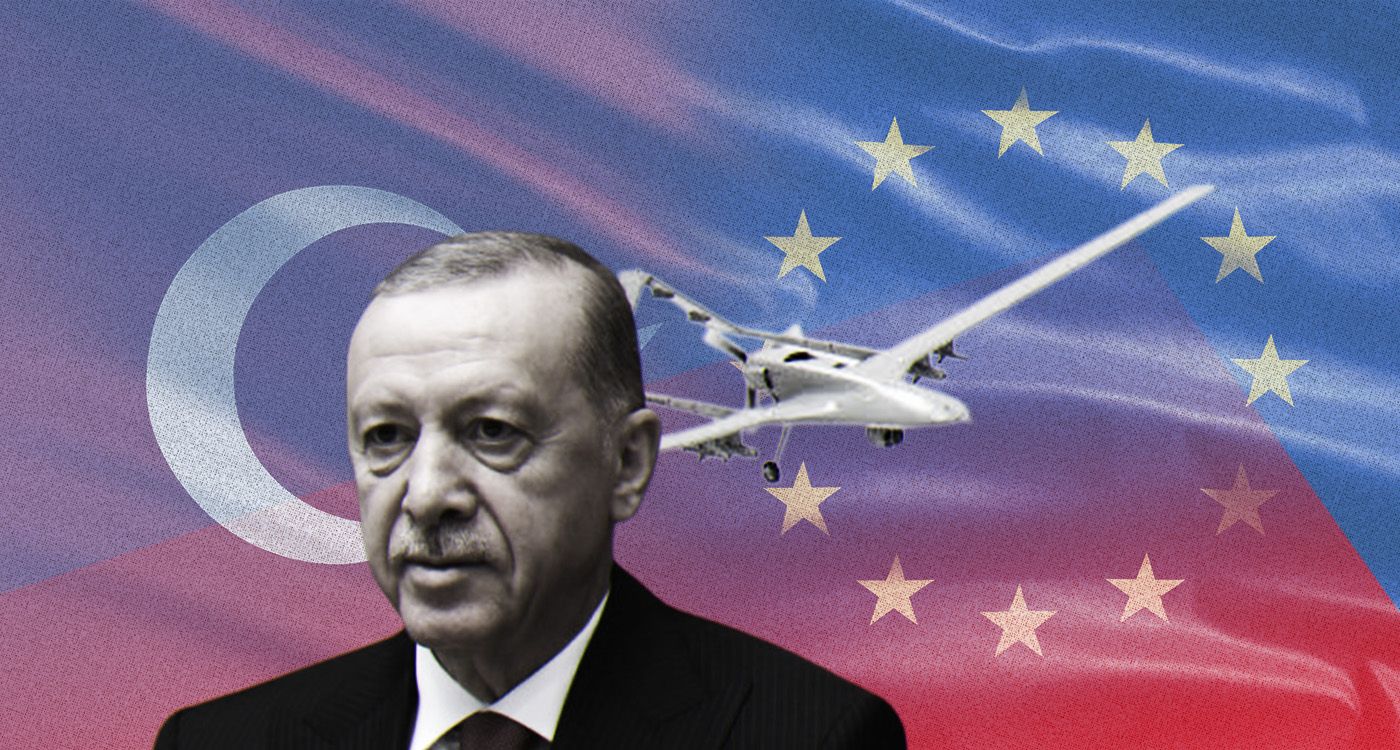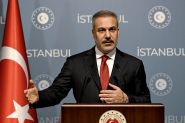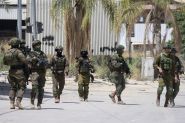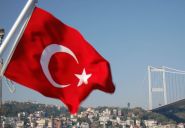- Home
- Middle East
- Defense: As the US Disengages, Turkey Eyes the Old Continent

©This is Beirut
More overtures, arms contracts… As the European Union moves toward rearmament, abandoned by American President Donald Trump, Erdoğan’s Turkey is rubbing its hands with glee. With geopolitical reinforcement, economic opportunities and a tightening security grip, the stakes are high for the Turkish president.
While the world’s attention was fixed on the March 12 summit between Ukraine and the United States in Jeddah, Saudi Arabia, another important meeting was taking place in the region – in Ankara. It brought together Polish Prime Minister Donald Tusk and Turkish President Recep Tayyip Erdoğan, with the aim of strengthening ties between the European Union (EU) and Turkey.
“Our countries hold an indispensable place in the future of Europe’s security architecture,” declared the Turkish president. He also called for deepening the relationship “on the basis of mutual respect and shared interests.”
But perhaps Erdoğan’s most notable remark to his guest was, “If the European Union wants to avoid a loss of influence – or even reverse the current trend – it can only do so with Turkey’s full and complete accession.”
In the wake of the geopolitical earthquake triggered by the Trump administration, which cast doubt on the US’s willingness to continue backing the Europeans, Turkey is positioning itself. Its leaders are increasing their overtures toward the EU, while security-related meetings between the two sides are multiplying.
Indeed, as Erdoğan and Tusk met, the chiefs of staff of the French, British and Turkish armies were holding a tripartite meeting in Paris on European security. Meanwhile, Turkish Foreign Minister Hakan Fidan emphasized that the Turkish military is now a proven force in both manpower and equipment, boldly asking the Europeans, “How many such armies can you find in Europe?”
Turkey’s Rising Star
These aren’t empty words. Within the EU, countries like France, Italy, Poland and Germany are rearming rapidly – though they are only just beginning the process, with Poland slightly ahead. But in terms of combat experience, aside from France (whose forces have fought in the Sahel and the Middle East), the other 26 armies’ involvement has mostly been limited to UN peacekeeping missions.
That is not the case for Turkey’s military. From Syria to Libya, Turkey – which boasts NATO’s second-largest land force after the US – has gained considerable combat experience.
More importantly, Turkish-made military equipment has proven effective on the battlefield. From Ukraine to Nagorno-Karabakh to Sudan, Ankara’s arms exports are booming – led by the famous drones from the company Baykar, whose CEO is none other than the Turkish president’s son-in-law.
Over the past 20 years, Turkey’s defense industry has taken off. Once highly dependent on foreign equipment, it now meets the majority of national needs. As noted by French daily Le Monde on March 7, Turkey’s dependence on foreign military hardware has dropped from 70% to 30%.
Meanwhile, Turkish defense firms have rapidly expanded their customer base. Take the Bayraktar TB-2 drone, known for its effectiveness against Russian forces in Ukraine: its order book keeps growing.
The TB-2’s low cost and reliability are attracting buyers worldwide – from the UAE, Morocco and Mali to potentially even Japan. The drone averages $5.5 million, compared to about $33 million for its US counterpart, the MQ-9 Reaper – though the latter offers superior performance.
Meeting European Needs
The performance of Turkey’s defense industry could become particularly appealing to European governments. Most still depend heavily on military purchases from across the Atlantic.
Aside from France, which maintains strategic independence in this area, EU countries continue to procure extensively from Washington. As reported by French magazine Le Point, between 2019 and 2023, about 55% of the EU’s total arms imports came from the US, according to the Stockholm International Peace Research Institute (SIPRI).
This dependency poses a potential problem. Between spare parts, ammunition and software updates, a refusal from the US could paralyze European supply chains. In this context, Europe’s defense strategy would benefit from diversifying its suppliers. This is where Turkey comes in. Its weapons systems, compliant with NATO standards, are largely compatible with European requirements.
Some European manufacturers have already crossed the Rubicon. Italian firm Leonardo, which has prior experience collaborating with Turkey on the T-129 attack helicopter, announced on March 7 a new partnership with Baykar. The goal? To break into the European drone market – a sector where European armies lag due to lack of investment.
Amid Europe’s unprecedented 800-billion-euro rearmament push, Turkey clearly wants a piece of the pie. As Erdoğan stated on March 7, there is “no justification” for Turkey’s exclusion from EU “defense procurement and reconstruction programs.”
Roadblocks
Still, nothing is guaranteed. Of the previously mentioned 800 billion euros, 150 billion comes from a European Commission defense fund intended to boost member states’ military spending – with a key condition: the money must be spent exclusively on European-made equipment. The aim is to keep as much of the financial outlay as possible within the EU.
Beyond the economic considerations lies the political issue. Within the EU, some view closer ties with Ankara warily. In Greece – which has a tumultuous relationship with Turkey, despite both being NATO members – the conservative daily Kathimerini warned on March 15 of the risks posed by Turkey’s growing influence within the EU.
For the Greeks, Turkey’s rhetoric on the Aegean Sea is cause for concern. In recent years, Erdoğan’s government has issued numerous irredentist statements and challenged Greece’s sovereignty over several territories.
The same goes for Cyprus, another EU member whose northern half remains occupied by Turkey, which backs a self-declared state recognized only by Ankara. Turkey also has its eyes on Cyprus’s Exclusive Economic Zone (EEZ), part of its “Blue Homeland” (Mavi Vatan) doctrine – aimed at expanding Turkish dominance in the eastern Mediterranean. All of this could hinder closer EU-Turkey ties in Brussels.
Political Underpinnings
Whether other European countries will follow Greece’s lead remains to be seen – for now, Turkey has the upper hand. While waiting for any concrete strengthening of ties, Erdoğan already seems to be taking advantage of Europe’s political paralysis; he has taken steps to consolidate domestic power.
The March 18 arrest of Istanbul’s mayor Ekrem İmamoğlu – Erdoğan’s main rival in the upcoming presidential election – illustrates a highly opportunistic move by the Turkish president. He is using the international context to imprison his main opponent and tighten his grip on power.
İmamoğlu’s detention sparked massive protests across Turkey, which were met with arrests and bans on public gatherings. Yet the EU has remained notably silent. In the face of Erdoğan’s authoritarian drift, France and Germany have expressed concern – but without taking any real action.
Nature abhors a vacuum – and the one left by the US in Europe is waiting to be filled. Erdoğan understands this well, and he’s betting on the West’s inaction to consolidate his authority, capitalizing on Turkey’s growing strategic role in NATO and regional diplomacy – and positioning himself as a geopolitical power player not to be ignored.
Read more




Comments